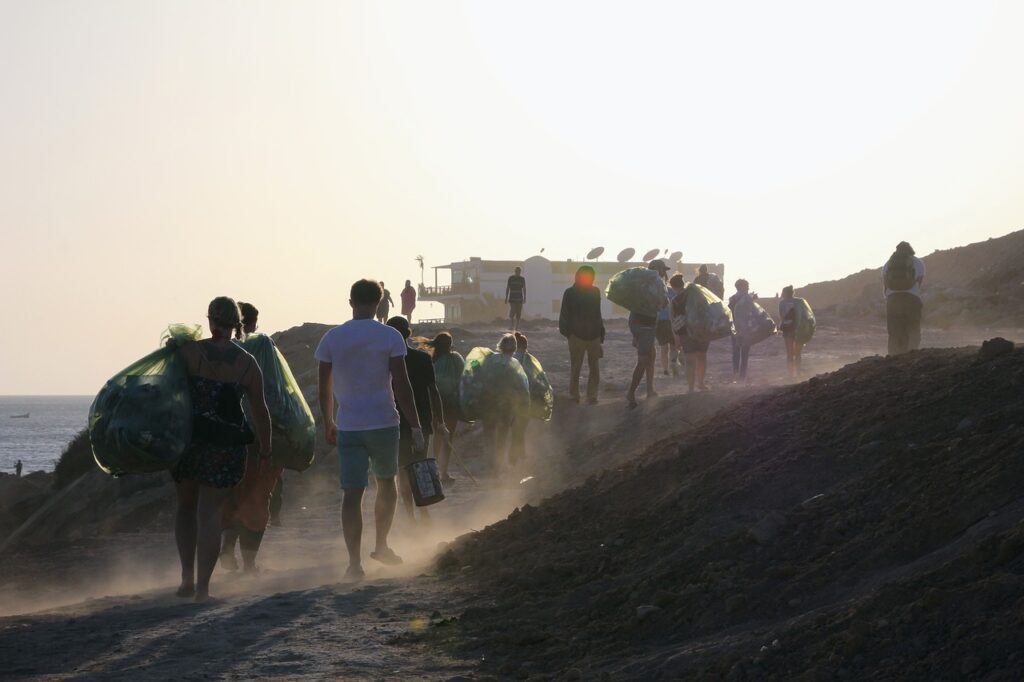Feeling overwhelmed by the climate crisis? Don’t worry, you’re not alone. Saving the planet doesn’t have to mean losing your sanity. Here are 15 practical and simple tips to help you make a difference without causing stress.

1. Ditch the Disposable Plastics
Single-use plastics are the environmental equivalent of an uninvited guest who overstays their welcome. They clog our oceans, choke our wildlife, and have a longer lifespan than your average tortoise. But fear not! Making the switch to reusable bags, bottles, and straws is easier than you think. Imagine strutting through the grocery store with your chic, reusable bag – you’re not just saving the planet, you’re making a fashion statement.
2. Establish Meatless Mondays
Did you know that cutting out meat just one day a week can significantly reduce your carbon footprint? It’s true! Going meatless on Mondays is a delicious way to help the environment. Try out some scrumptious vegetarian recipes like a hearty lentil stew or a zesty vegetable stir-fry. Your taste buds – and the planet – will thank you.
3. Opt for Energy-Efficient Appliances
Switching to energy-efficient appliances is like giving your home an eco-friendly makeover. Not only will you save on your electricity bill, but you’ll also reduce greenhouse gas emissions. Look for the Energy Star label when shopping for new appliances, and remember – it’s the little things, like using a programmable thermostat, that can make a big difference.
4. Drive Less, Walk More
Driving less and walking more is a win-win for both your health and the environment. Carpooling, biking, or using public transportation are great ways to cut down on carbon emissions. Plus, walking gives you a chance to enjoy the great outdoors, clear your mind, and maybe even meet your neighbors (from a safe, socially-distanced space, of course).
5. Reduce, Reuse, Recycle
The three Rs are the holy trinity of waste management. Reducing waste means buying less and choosing products with minimal packaging. Reusing involves finding new ways to use old items, like turning an empty jam jar into a trendy vase. Recycling is all about making sure your waste ends up in the right place. By following these principles, you can significantly cut down on your environmental impact.
6. Support Local and Sustainable Brands
Choosing to support local and sustainable brands is like casting a vote for the kind of world you want to live in. Look for companies that prioritize ethical production practices, use eco-friendly materials, and give back to their communities. By supporting these businesses, you’re helping to build a more sustainable economy.
7. Go Digital to Save Paper
Going digital is a simple way to reduce your paper waste. Opt for electronic bills, tickets, and notes whenever possible. Not only will you save trees, but you’ll also declutter your home. Who knew that saving the planet could also mean a tidier workspace?
8. Conserve Water
Conserving water is crucial for maintaining our planet’s health. Fixing leaks, taking shorter showers, and installing water-efficient fixtures are easy ways to cut down on water usage. Remember, every drop counts!
9. Plant a Tree or Two
Planting trees is one of the most effective ways to combat climate change. Trees absorb carbon dioxide, provide oxygen, and create habitats for wildlife. Get involved in local tree-planting initiatives or plant a tree in your backyard. It’s a small act with a big impact.
10. Switch to LED Lighting
LED bulbs use significantly less energy than traditional incandescent bulbs and last much longer. By switching to LEDs, you can reduce your carbon footprint and save money on your electricity bill. It’s a bright idea all around.
11. Make Your Own Cleaning Products
Homemade cleaning products are not only eco-friendly but also cost-effective. Simple ingredients like vinegar and baking soda can be used to create effective cleaners without the harsh chemicals found in commercial products. Plus, you’ll avoid the potential hazards of accidentally creating deadly gases with bleach.
12. Educate Yourself and Others
Staying informed about environmental issues is key to making a difference. Read books, watch documentaries, and follow reputable sources online. Share what you learn with friends and family to spread awareness. Knowledge is power, and together, we can create change.
13. Reduce Food Waste
Reducing food waste is as simple as planning your meals, storing food properly, and getting creative with leftovers. Not only will you save money, but you’ll also reduce methane emissions from landfills. Remember, every bit of food saved is a win for the planet.
14. Support Renewable Energy
Supporting renewable energy is crucial for reducing our reliance on fossil fuels. Choose green energy plans if available in your area, invest in solar panels, or support policies that promote renewable energy sources. Every step towards a renewable future is a step towards a healthier planet.
15. Get Involved in Community Initiatives
Participating in local environmental groups, clean-up events, and advocacy efforts can have a significant impact. Join forces with like-minded individuals to tackle environmental issues in your community. Together, we can create a cleaner, greener world.
 After a long day of beach cleaning
After a long day of beach cleaning
Conclusion
Saving the planet doesn’t have to be a Herculean task. By incorporating these 15 practical tips into your daily life, you can make a meaningful difference without losing your sanity. Remember, every small action contributes to a larger positive impact. Start with a few changes and build from there. Saving the planet is a journey, not an overnight transformation.
By following these steps, you’ll not only contribute to a healthier planet but also inspire others to join the cause. Together, let’s create a world where art, values, and sustainability intersect beautifully – and where it’s okay to be a little awkward.
General Takeaways:
- Simple lifestyle changes can significantly reduce your environmental impact.
- Supporting sustainable practices and educating others are key components of environmental stewardship.
- Community involvement amplifies individual efforts, making a larger collective impact.

